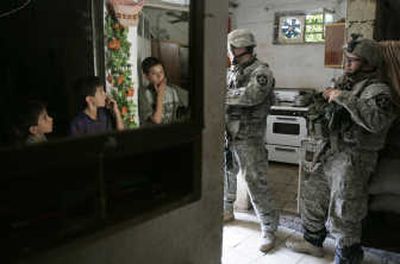No drawdown soon

WASHINGTON – Conditions in Iraq will not improve sufficiently by September to justify a drawdown of U.S. military forces, the top U.S. commander there said Sunday.
Asked whether he thought the job assigned to an additional 30,000 troops deployed as the centerpiece of President Bush’s new war strategy would be completed by then, Gen. David Petraeus replied, “I do not, no. I think that we have a lot of heavy lifting to do.”
Separate comments by Petraeus on “Fox News Sunday” and Ryan Crocker, the U.S. ambassador to Iraq, on NBC’s “Meet the Press” indicated the administration’s evolving strategy for confronting rising congressional demands to begin planning troop withdrawals.
In addition to warning about the possible regional consequences of withdrawal, both men emphasized a “mixed” picture on the ground that cited successes while acknowledging the difficulty of the task ahead.
Claiming steady, albeit slow, military and political progress, Petraeus said the “many, many challenges” would not be resolved “in a year or even two years.”
Similar counterinsurgency operations, he said, citing Britain’s experience in Northern Ireland, “have gone at least nine or 10 years.”
In announcing his new strategy last January, Bush said the troop increase would diminish sectarian violence in Baghdad and break Sunni insurgent control in Anbar province, a stronghold of al-Qaida in Iraq. The ensuing calm, the administration said, would give the Shiite-dominated government time and space to reconcile with the minority Sunni and Kurdish communities and build a unified administration that all Iraqis – including many now involved in violence – would support.
But since the deployment of five new U.S. combat brigades began in early spring, the overall level of violence has not abated, and in some respects has increased, according to a Pentagon report issued last week.
Little progress has been reported in achieving the political benchmarks spelled out in the funding legislations as well as a revision of the Iraqi constitution to provide a better balance of regional and sectarian factions in the government.